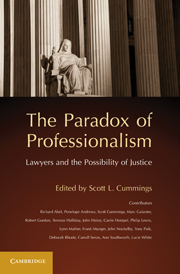Book contents
- Frontmatter
- Contents
- List of Tables and Figures
- Contributors
- Preface and Acknowledgments
- 1 Introduction
- PART I LAWYERS AND THE PUBLIC GOOD: THE FUNDAMENTAL DILEMMA
- PART II LAWYERS AND THEIR CLIENTS: DETERMINANTS OF ETHICAL PRACTICE
- PART III LAWYERS AND SOCIAL CHANGE: MOBILIZING LAW FOR JUSTICE
- 10 Without Fear, Favor, or Prejudice
- 11 Lawyers in National Policymaking
- 12 Cause Lawyers and Other Signs of Progress
- 13 African Youth Mobilize against Garbage
- 14 Epilogue
- Index
- References
10 - Without Fear, Favor, or Prejudice
Judicial Independence and the Transformation of the Judiciary in South Africa
Published online by Cambridge University Press: 05 June 2012
- Frontmatter
- Contents
- List of Tables and Figures
- Contributors
- Preface and Acknowledgments
- 1 Introduction
- PART I LAWYERS AND THE PUBLIC GOOD: THE FUNDAMENTAL DILEMMA
- PART II LAWYERS AND THEIR CLIENTS: DETERMINANTS OF ETHICAL PRACTICE
- PART III LAWYERS AND SOCIAL CHANGE: MOBILIZING LAW FOR JUSTICE
- 10 Without Fear, Favor, or Prejudice
- 11 Lawyers in National Policymaking
- 12 Cause Lawyers and Other Signs of Progress
- 13 African Youth Mobilize against Garbage
- 14 Epilogue
- Index
- References
Summary
“While the independence of our judiciary is partly safeguarded by the institutional mechanisms contained in the Constitution, the judiciary can be said to be truly independent only if all important role players in society respect and protect the freedom of judges to do their jobs ‘without fear, favour or prejudice.’”
INTRODUCTION
The system of apartheid was deemed a crime against humanity by the United Nations in 1973. As Martin Chanock and John Dugard have demonstrated in their scholarship, it was primarily the processes of law that maintained this system. Under apartheid, the system of parliamentary supremacy allowed the executive and legislature to ride roughshod over a judiciary that was not empowered to overturn laws passed by Parliament. Moreover, judges – all white – appointed during the apartheid years for the most part supported the status quo and were indeed appointed largely on the basis of their commitment to white supremacy. In contrast, one of the defining features of the post-apartheid constitutional democracy is the independence of an increasingly racially diverse judiciary, and the power vested in the courts, particularly the Constitutional Court, to act as a check on executive and legislative power.
Against the backdrop of the emergence from authoritarianism and apartheid to a constitutional democracy embracing human rights for all, this chapter explores two questions. The first relates to “the circumstances under which, extent to which, and way in which legality constrains state power.”
- Type
- Chapter
- Information
- The Paradox of ProfessionalismLawyers and the Possibility of Justice, pp. 197 - 219Publisher: Cambridge University PressPrint publication year: 2011

